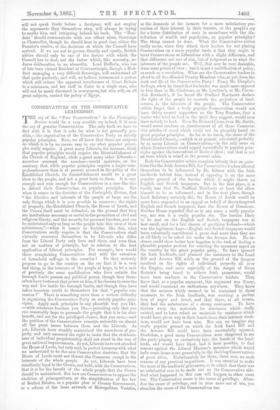LORD DUFFERIN IN CAIRO.
THE despatch of Lord Dufferin to Cairo, with permission to remain there, if needful, for three months, and with in- structions to all concerned to regard him as the sole British representative, is a very strong measure, and may prove a very wise one. Affairs in Egypt were getting into a knot, which it was necessary to cut. The Khedive, though "docile," in a way, like every other Egyptian—he is not a pure Turk, but on the mother's side an Egyptian Fellah—has obstinacy somewhere in his character, and suffers under a position which, to any man bred in a Palace, and accustomed to the Asiatic form of power, must be very nearly unendurable. If, urged by some pressure, he turned restive, told Sir E. Malet that he was by British admission Ruler of Egypt, and that he should do as he pleased, the situation would become, to say the least, excessively complicated, would be soluble, perhaps, only by the arrest of the Khedive in his own Palace. The Egyptian Ministry at Cairo, who at heart are sore at their own subordination to Infidels—vide Riaz Pasha's talk in Paris, passim—have grown restive under what they think the humiliation of Arabi's trial and the British refusal to aid in reconquering the Soudan, and are suggesting very odd things indeed,—for example, the re- organisation at once, by decree, of the whole Egyptian Army, to go and fight the Mehdi, with such matdriel as can be drawn from the depleted arsenals. When that work was done, Egypt would again be at the disposal of the Army only this moment dissolved. The organisation of the new Army makes no progress, the British Government by no means approving either of Baker Pasha or Baker Pasha's plans, and desiring some scheme a little less like the organisation of a force of Janissaries. The Native Administration is in great disorder, much too anxious to avail itself of its grand chance of punishing personal adversaries, and by no means ready to accept British counsel, to which, nevertheless, it bows in all apparent humbleness. There is no willing deference on great subjects, but Arabs are flogged for incivility to Euro peens in the public streets. Above all, the British Govern- ment are perplexed and worried, not only by the original trouble of a situation under which they are nominally only the Khedive's friends, but are, in practice, compelled to order that British reporters shall be present at Arabi's trial—thus, as Sir Charles Dilke put it, "trying to govern Egypt by tele- graph "—but by the impossibility of deciding at such a distanee on the personal questions involved, the true character of anybody, the true attitude of any party, the condition of opinion, especially as regards the Khedive's ability to stand alone. None of their agents in Egypt are quite of the first class, none quite know the ideas of the British Cabinet, and most of them are a little too "experienced." Experience is invaluable, in most of the business of life ; but there are situa- tions and crises in which experience is purely misleading, in which the friendships, enmities, and preconceived judgments of the trusted agent produce nothing but misconception. It is not from old Generals that one gets Army reforms, and it is no discredit to Sir E. Malet to say that he must have settled his judgment almost immovably upon every Egyptian personage and question years ago. A man with a new mind is required, to survey the whole scene on the spot, to con- vince or overawe Egyptian dignitaries, to impress the " ex- perienced" Europeans who are so anxious to shoot everybody, and to act for a short time like an Indian Resident at a Native Court, the quiet adviser who is hardly even an Ambassador, but who embodies when he speaks the whole authority of the Paramount Power. A man is wanted who can govern for the nonce, ,yet not be eternally in front. To select for such a post the matt who is Ambassador to Constantinople, and therefore entitled throughout the Sultan's dominion to sovereign rank, who does not know Egypt, but does know thoroughly the Turkish .Court, Turkish Pashas, Turkish ways, and British opinion, who never offends anybody, and never gives way to anybody, is a stroke of political genius which may; Perhapa,, beet be measured not by the silence of English parties, hut by the dumb consternation of the Sultan.
"What the man who knows all our intrigues and all our objects, all our weak places and all our personages, and has three times defeated us, going to settle Egypt ? The Day of Wrath has arrived." That temper of the Sultan will be re- flected in Cairo, and will of itself greatly increase the respect with which the new agent of British authority will be received. The very Padishah is afraid of him.
The first object of Lord Dufferin will be, of course, to decide how far the declared purpose of the British Government, again repeated only one week since by Mr. Gladstone—the purpose of keeping up the Khedive's Government—is permanently possible. We cannot venture to anticipate his conclusion, even in our own minds, but we venture to believe that two convictions will dawn upon him very rapidly indeed. One is, that if there is to be a Native Government in Egypt at all, it must be left much more alone, at all events in public ; that if the details of Egyptian Administration are to be considered within the purview of Parliament, and British Ministers are to answer questions upon them as if they were responsible, and to send out orders dictated by "the general sense of the House," annexation will, in all embarrassing senses, have already occurred. And the other is, that the Native Administration in Egypt wants a head,—a real head, and not a nominal one ; some one who can be effectually impressed by private advice, who, if convinced, can act on his conviction, who can, if he promises anything, bind his Government. The Egyptian
Administration of to-day is, in this respect, an anomaly among either Oriental or Western Governments. From the accession of Mehemet Ali down to that of Tewfik, the Viceroy of Egypt, whatever his title, has been a personal ruler, has governed for himself, and has arranged all negotiations with foreign Powers. Tewfik, however, was expected to be in some sort Constitu- tional; and a Ministry was, therefore, constructed for him, which was to advise, and act, and be "responsible," if not to the Egyptians, at least to England and France. This
Ministry, however, being an artificial creation, has no natural head, no chief whose decision, however courteously conveyed, is in the long-run final ; no one who, to use Lord John Russell's acute illustration, if he differs with a colleague, receives his resignation, and does not offer his own. There is no Vizier in Egypt, and no true Premier, and no " Dewan," the singular name signifying "general agent," now used throughout India to designate the removable head of a Native State, who is more than a Premier, yet more fettered by the laws than a Vizier. If the Khedive is to govern, there is, of course, no need for such an officer ; but if he is incom- petent, yet in practice irremovable, a native Chancellor of
Egypt, on whom the wrath of the Protecting Power could fall, and who was entitled, at least, to rebuke a colleague, would seem
to be indispensable. He is found so in every European Adminis- tration, though in Europe personal government is supposed to be extinct, and in Egypt he is especially needed. The root of all trouble there in reconstructing the Government is that Tewfik has no governing power, no way of compelling the Adminis- • tration to march in a certain direction, even if the British troops are withdrawn. He is a man who can be rebelled against in safety. That being the case, it is necessary to supply him with a Chancellor whom the natives will recognise as a native, and who, though he can be trusted to take British advice, is still capable of governing in the native way. The British Government finds and utilises dozens of such men in India, some of them men of exceptional ability, born organisers like Madhava Rao, or born rulers like Salar Jung, and they must be discoverable in Egypt. No such man has, however, been discevered yet, and until he is, the task of a Resident will be one of endless difficulty and very little success.
It is through a Resident, clearly, though probably under some other name, that the British Government is about to act.
The mere force of circumstances has already driven them to appoint one, though he is called an Ambassador on leave ; and all the negotiations about the Control have ended in the suggestion that for five years there shall be one Con- troller, and he shall be an Englishman. The general foreign adviser will be an Englishman, also, and as he is sup- ported by the British Government, and as all other Govern- ments are warned off, he will, whatever his designa- tion, be a "Resident," too. We only hope that when Lord Dufferin draws up the inevitable scheme defining his powers, that he will not insist on the " Resident's " right to be present in meetings of the Egyptian Cabinet. That is a gross mistake, as gross as it would be to admit foreign Am- bassadors into an English Council. It always enils,.
must end, in secret meetings. The Egyptian Ministers will not speak freely before a foreigner, will not employ the arguments they themselves obey, will always be trying to soothe him, and intriguing behind his back. The "Resi- dent" should communicate with one officer alone, Sovereign or Chancellor, though he should hear in good time either. the Premier's resolve, or the decisions at which the Council have arrived. If we are not to govern directly and openly, British advice should only be one of the factors with which the Council has to deal, not the factor which, like necessity, re- duces deliberation to an absurdity. Lord Dufferin, who has of late been virtual Resident at Constantinople, though a Resi- dent managing a very difficult Sovereign, will understand all that quite perfectly, and will, we believe, recommend a system which will reduce the apparent interference of Great Britain to a minimum, and her staff in Cairo to a single man, who will not be much discussed in newspapers, but who will, on all great subjects, control the policy of Egypt.



































 Previous page
Previous page